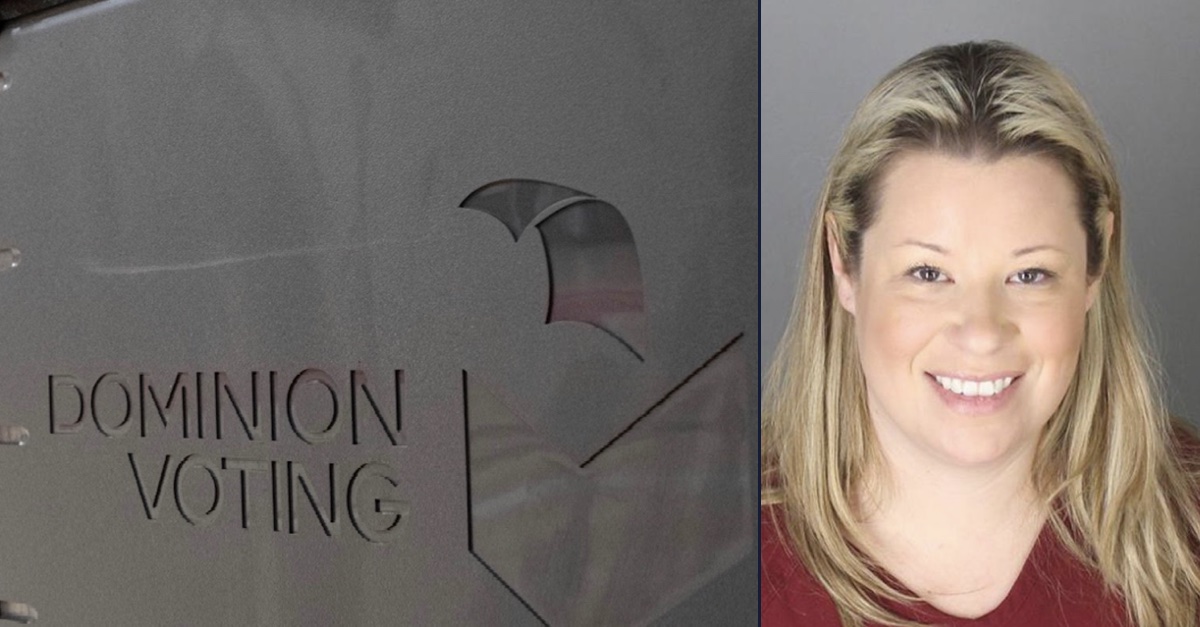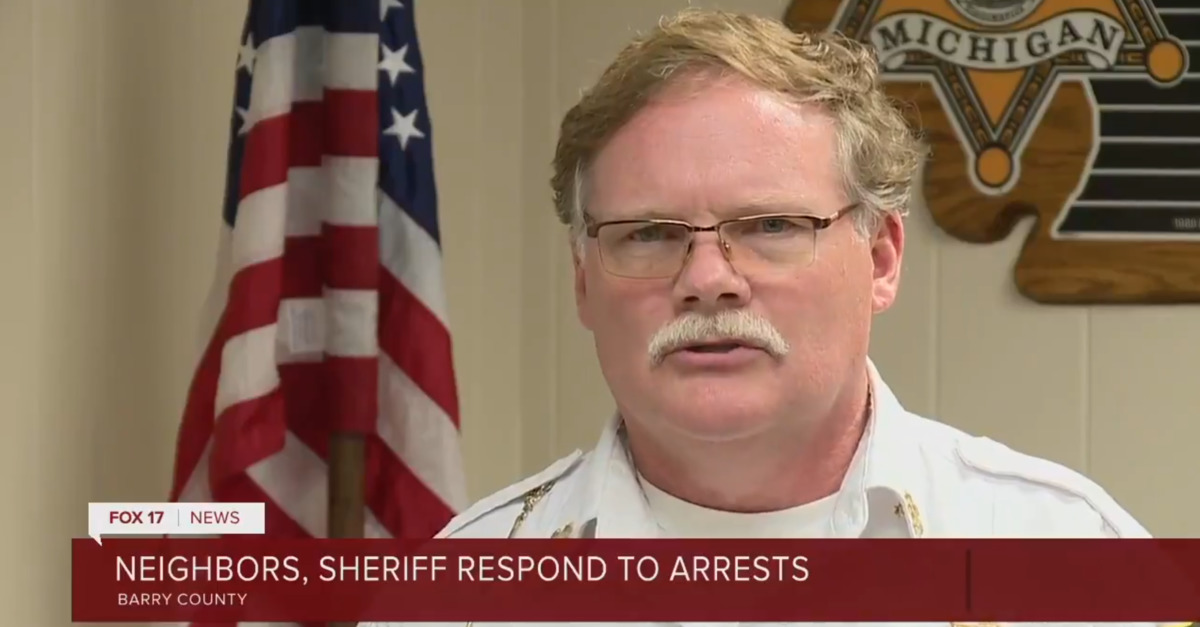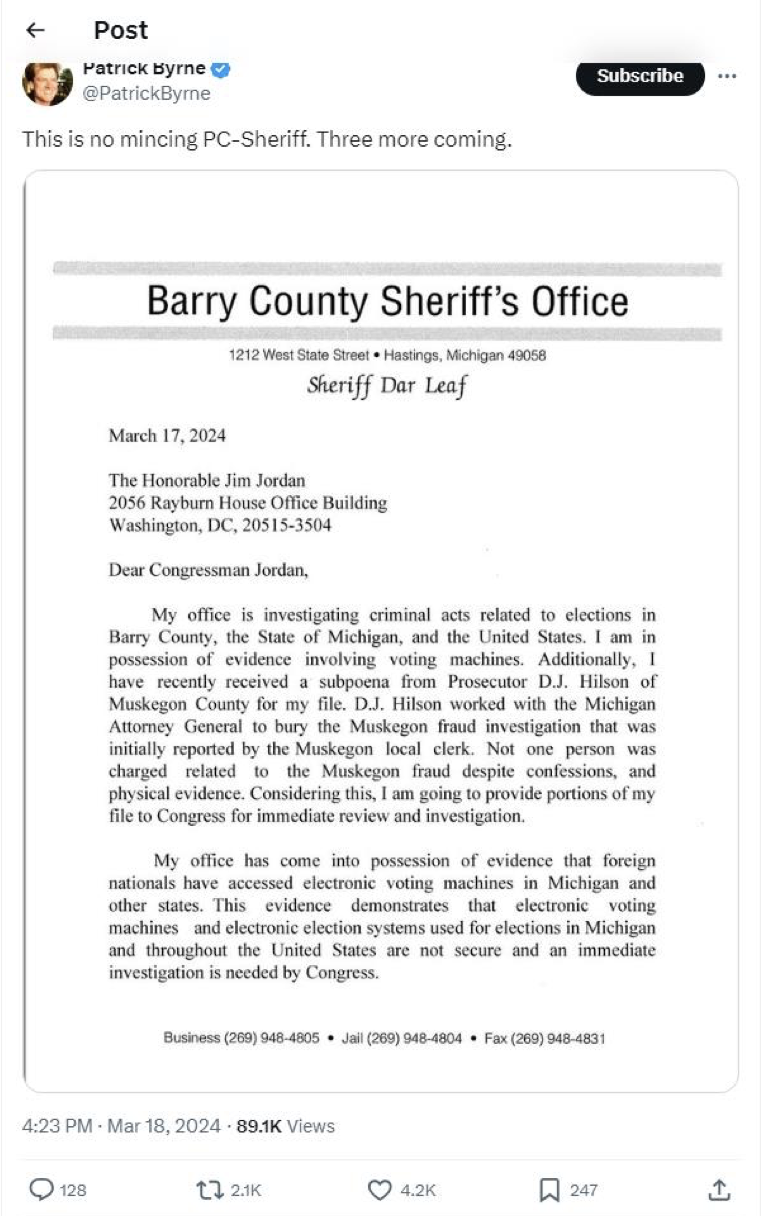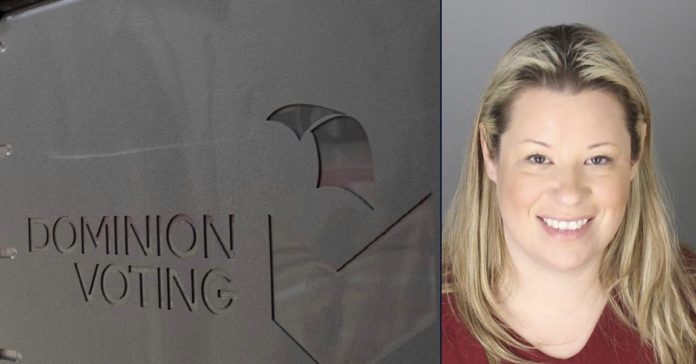
Dominion Voting Systems (AP Photo/Ben Gray, File), Stefanie Lambert (Oakland County Sheriff’s Office)
Lawyers have renewed their demand for a “Kraken” lawyer’s ouster from representing former Overstock CEO Patrick Byrne in Dominion Voting Systems’ billion-dollar defamation lawsuit, saying that the defendant and his lawyer appeared to give a sheriff “username-and-password access” to discovery to boost the law enforcement officer’s 2020 election criminal probe.
Last Friday, one day after a U.S. magistrate judge ordered Stefanie Lambert and her client Patrick Byrne to “immediately desist” from discovery leaks, Dominion lawyers filed a reply to further support their request to have the “Kraken” attorney kicked off of the case posthaste.
Earlier last week, Lambert appeared in court for a hearing in Washington, D.C., was placed under arrest when that proceeding ended, and spent a night in jail. The attorney, known for her involvement as local counsel in the ill-fated Michigan version of the “Kraken” lawsuits to overturn the 2020 election, only escaping sanctions after an appeal, is currently under felony indictment for an alleged conspiracy to gain unauthorized access to and willfully damage voting machines in the Wolverine State. After Lambert no-showed a March 7 court date, a state judge issued a bench warrant, but she was not arrested for 11 days, until March 18.
The day after her D.C. arrest was arrested by U.S. Marshals, Lambert was allowed to drive home to Michigan and turn herself in, which she did — leading her to be fingerprinted and to the collection of a DNA sample in Oakland County. A mug shot was also taken, and Lambert smiled for the camera.
On March 18, Dominion said Friday, the company learned “for the first time” that Lambert’s “series of knowing violations” of a discovery protective order were even more extensive than initially known.
Dominion originally learned about the discovery “breach” on March 12 from attorney Robert Driscoll, who represented Byrne up to that point. Lambert filed a notice of appearance as Byrne’s lawyer and Driscoll withdrew from the case the same day. Driscoll emailed Dominion to inform them that Lambert shared discovery with non-party Barry County Sheriff Dar Leaf and also filed discovery material in her criminal case.
When pressed, Lambert said that Byrne “directed” her to violate the protective order and justified the leak by saying she forwarded evidence of 2020 election “criminal activity” to law enforcement, according to court documents.
On Friday, Dominion said Lambert went a step further by handing the election-denying sheriff “username-and-password access to the entire repository of more than 1 million documents Dominion (to say nothing of the third parties in this case whose documents, including their confidential documents, have also been provided to Byrne) have served to date.”
Not only did Lambert and Byrne “knowingly” and remorselessly leak the documents while failing to “provide any authority for their unilateral decision,” Dominion said, the duo “apparently” gave a sheriff fighting a subpoena and running a criminal probe of Dominion employees unauthorized access to discovery material that he touted in a March 17 letter to Rep. Jim Jordan, R-Ohio.
In that letter, Leaf indicated that his “office has come into possession of evidence that foreign nationals have accessed electronic voting machines in Michigan and other states,” not explaining where that “evidence” had come from.
Leaf disclosed — via an X account that created in March 2024 and began posting a series of Google Drive dumps starting on March 17 — that he’s investigating “conspiracy crimes, wire services fraud, honest services fraud, and perjury charges,” connected to Dominion CEO John Poulos’ “sworn testimony before the Michigan Legislature that its voting systems could not be accessed or connected to by outside networks and sources, and that it was a ‘US based company.””

Barry County Sheriff Dar Leaf (FOX17/screengrab)
While it was clear that the documents came from Dominion discovery because they were Bates stamped “DOM_DC,” Dominion said, the “full extent of Lambert’s and Byrne’s wrongdoing remains unknown.”
In defense of her actions, Lambert said discovery included emails written in “Serbian and foreign languages” that she claimed were “evidence of criminal violations,” namely, “top level Dominion employees directing and tasking foreign nationals to remotely access voting machines utilized in the United States during the November 3, 2020 election.”
Dominion already responded by dismissing Byrne and Lambert’s “xenophobic conclusion is that any email from non-US-based Dominion personnel is conclusive evidence of criminal activity,” but the latest filing emphasized that Lambert’s disqualification is necessary as there is little to nothing to suggest that she would refrain from further discovery abuses.
By way of example, although the U.S. magistrate judge entered a written order demanding an end to discovery leaks on March 21, the judge “orally ordered” the same during the March 18 hearing — and that did not stop Patrick Byrne from sharing Sheriff Leaf’s letter to Rep. Jordan hours later.

“Since Monday’s hearing, during which the Court orally ordered that Lambert and Byrne make efforts to maintain the status quo during the pendency of this Court’s consideration of this issue, Lambert and Byrne have done nothing of the sort,” Dominion said. “Instead, they have chosen to continue to promote their false claims about the documents they leaked, violating at least the spirit (and likely also the letter) of this Court’s most recent order.”
“Their recent media and social media activity is further evidence that nothing short of Lambert’s disqualification will preserve the integrity of this proceeding,” the reply in support continued. “And that sanctions will also need to be addressed for Byrne.”
Dominion previously accused Lambert of violating D.C. Rule of Professional Conduct 3.4(c) and suggested she could face sanctions given the clear language of the protective order: “[R]eleasing, leaking, or otherwise disclosing Confidential or Attorneys’ Eyes Only Discovery Material to persons or entities not entitled to such Discovery Material under this Order, the Court will have authority to impose sanctions under Rule 37(b)(2)(A)(i)-(vi).”
If Lambert did it before, she’ll do it again, and that cannot stand, the Dominion lawyers concluded in their latest response:
What assurance could Lambert possibly give this Court or to ensure that she will not leak this information at the first opportunity? She has already promised to follow the Protective Order once, which she violated based on her and her client’s utterly unsupported estimation that they had a right to do so. And when then again ordered by this Court—this time to stand down from further disseminating the information—she and her client continued to try to drive people to the very documents they had improperly made public.
What are we to tell our client if Lambert were left on this case? Don’t worry, she’ll probably follow the Court’s order this time? Any assurance from Lambert at this point is completely meaningless to Dominion. Worse still, given her history of misconduct, the only lesson Lambert will likely learn is that next time, she needs to do a much better job laundering her improper disclosure of Discovery Material.
Read the filing here.
Have a tip we should know? [email protected]

